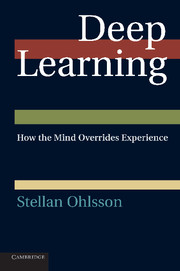1 - The Need to Override Experience
Published online by Cambridge University Press: 25 January 2011
Summary
Upon those who step into the same stream ever different waters flow.
HeraclitusNothing so like as eggs, yet no one, on account of this appearing similarity, expects the same taste and relish in all of them.
David HumeLife is change. Natural forces continuously knead our material environment as if it were so much dough in the cosmic bakery, and few features of our social environment remain constant for even one generation. How do human beings live in ubiquitous change? How do we cope with, and adapt to changes in our environment? How do we initiate change and create novelty? Due to late 20th-century advances in the natural sciences, these questions are more difficult to answer than they once seemed.
Few changes are so beguiling to children, poets and whomever else has the good sense to stop and look as a change of season. In four-season climes, the visual transformation of the landscape as the dominant color moves from green to red and on to white is stunning. The spectacle of an early autumn snowstorm must have overwhelmed the first band of hunter-gatherers to push north into a temperate climate zone and convinced them that their world was coming to an end.
Yet, children, poets and hunter-gatherers are wrong; striking as it is, seasonal change is no change. Winter displaces summer, true enough; but after winter, summer returns, and all is as it was. The change is cyclic, hence stable; hence not a change.
- Type
- Chapter
- Information
- Deep LearningHow the Mind Overrides Experience, pp. 3 - 23Publisher: Cambridge University PressPrint publication year: 2011



